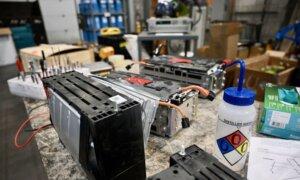‘If batteries are free for export, then you won’t have a recycling industry in Australia, while people can go to cheaper countries,’ said Lithium Australia CEO.
An Australian lithium technology company has proposed banning the export of used batteries to support the local recycling industry.
Speaking at a parliamentary inquiry hearing on Aug. 8, Lithium Australia CEO Simon Linge stressed the industry’s critical role in the transition to electric vehicles (EVs) as more people adopted the technology.
“The Australian Electric Vehicle Council estimates that more than 98,000 EVs were sold in Australia last year, and more than 180,000 vehicles are now on our roads today,” he told the Standing Committee on Climate Change, Energy, Environment, and Water.
“This growth referenced both a tremendous opportunity and a risk that requires careful management.”
As the materials and metals used in EV batteries were valuable but hazardous, Linge said a domestic recycling industry would bring about significant benefits to the economy and the environment.
Nevertheless, the CEO pointed out that few local businesses wanted to recycle lithium batteries in Australia.
“Too many companies, including some major brands that boast about their sustainability credentials, opt to ship batteries offshore to countries such as India because of their lower environmental and labour standards, allowing for cheaper processing,” he said.
“If batteries are free for export, then you won’t have a recycling industry in Australia, while people can go to cheaper countries.”
To tackle this issue, Linge proposed banning local companies from exporting used lithium batteries to other nations.
“We believe that the key drivers to support the best domestic battery recycling industry are banning batteries from export, banning all batteries from landfill, which some states have done already, and broadly harmonizing the regulation and standards across the nation for issues such as labelling, handling, storage, and transit,” he said.
“It’s important to acknowledge that recycling of any product, let alone something as complex and potentially hazardous as a battery, does come at a cost. But the short and long-term benefits are significant.”
According to the CEO, Lithium Australia recycled over 1.5 million kilograms of batteries in the last financial year and was expected to process the equivalent of 2,779 EV batteries in 2024.
Calls for More Regulatory Control
Further, Linge said there was a need to establish more regulatory control over the battery value chain in Australia.
Pointing to the quality of batteries, he said not all of them were of high standard.
“The vast majority of batteries are produced in China today,” Linge said.
“There are very good battery producers out of China, and there are less-quality producers of batteries.
“So regulation around standards of design, whether that’s an EV or in your electric toothbrush, is really important.”
The CEO also said there were issues with the way states and territories manage the battery value chain.
“Today, each state has different standards about an end-of-life battery, whether it can be transported in, what quantities it can be transported, and how it should be stored and managed,” he said.
“So even simple things like storage of a battery pre-life and post-life is really not clear.”
Linge then suggested Australia look to European countries for standards around regulation and battery passports.
Linge’s remarks come after the Association for the Battery Recycling Industry revealed that insurance costs were posing a significant challenge for the sector.
A main driver of the premium hike was the high number of fires caused by consumers’ incorrect disposal of batteries.






















